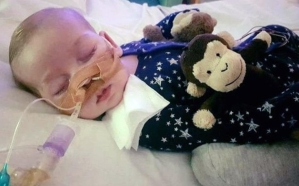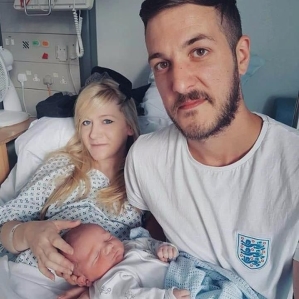A controversial pastor who prayed over Charlie Gard, the terminally ill ten-month-old baby from the UK, has called the prayer "one of the most important prayers I have ever prayed in my life" and urged Christians worlwide to continue to ask God to perform a miracle.
Reverend Patrick Mahoney was reportedly initially barred from entering Gard's room despite coming on invitation from Gard's parents, Chris Gard and Connie Yates, according to Daily Mail: "I was invited by Charlie's parents Connie and Chris to come from America to pray for Charlie, and it is stunning that I was denied from doing this," the pastor said. "In 40 years of pastoral ministry, I have never once been denied the right to pray over a patient in a hospital."
Mahoney said the incident "continues to show Great Ormond Street Hospital's disregard for the wishes of Charlie's parents. First the hospital denies care, and now they deny prayer."
Yates told Daily Mail she was "heartbroken" over the hospital's initial decision to keep Mahoney out of the little boy's room. The hospital cited concern over "security reasons" as justification for the move, but later reversed the decision amid backlash, allowing Mahoney entry.
Later, the pastor joined Yates and Gard for public prayer and addressed a crowd of supporters and the press outside the hospital.
He called the prayer "one of the most important prayers I have ever prayed in my life" and shared a photo of himself and Charlie's parents on Facebook: "Wonderful update and victory," he captioned the photo. "The hospital did allow me to go pray with Charlie. Here I am with his parents, Chris and Connie. Let's believe for a miracle and that Great Ormond Street hospital would continue do the right thing."

The Daily Caller notes that this is not the first time Mahoney has clashed with officials; the pastor was arrested in 2000 in front of the Supreme Court during a protest against abortion, and arrested twice in 2008 in China for leading demonstrations for religious liberty in Tiananmen Square.
As earlier reported, Gard and Yates had battled for months to be allowed to take their son, who suffers from a rare genetic condition and has brain damage, to America to undergo a treatment called nucleoside bypass therapy. Successive courts ruled in favor of Charlie's British doctors, who said it would be more charitable to allow the child to die.
The couple had taken their fight to the European Court of Human Rights in Strasbourg, France, after exhausting all legal options in the UK. However, in June, all seven judges refused to intervene and ruled the parents' application "inadmissible", stating that "the decision is final."
Judges also said it would be "futile" for Charlie to have further treatment because he has irreversible brain damage and cannot see, hear or move. They concluded the baby was "being exposed to continued pain, suffering and distress" and undergoing experimental treatment with "no prospects of success... would offer no benefit".
Amid public outrage, the U.K. High Court this week agreed to give Gard's case a new trial in light of new evidence concerning nucleoside bypass therapy presented by two international hospitals.

A number of leading politicians and religious leaders - including Pope Francis and U.S. President Donald Trump - have voiced their support for Gard and Yates, and one hospital even offered to provide free treatment for Charlie in the U.S.
The pro-life organization March for Life along with a coalition of other pro-life organizations presented a petition to the hospital July 7, which urged the hospital to allow Gard's parents to take him elsewhere for treatment.
"There are now seven doctors supporting us from all over the world -- from Italy, from America, from England as well -- and they think that [experimental treatment] has a chance, you know, up to 10 percent chance of working for Charlie, and we feel that that's a chance worth taking," Yates said Sunday, adding that they have been fighting for this opportunity since their son arrived at the hospital.
Gard said his son "should have had [experimental treatment] a long time ago" and thanked the supporters who signed the petition for their support.






